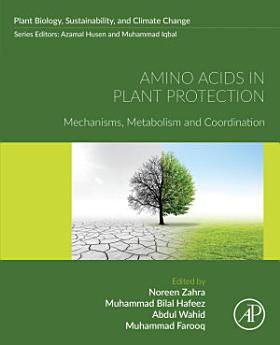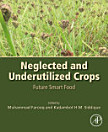Amino Acids in Plant Protection: Mechanisms, Metabolism and Coordination
About this ebook
About the author
Muhammad Bilal Hafeez is doing Ph.D. from College of Agronomy, Northwest A&F University, China. He did M.Sc (Hons.) Agronomy from the Department of Agronomy, University of Agriculture, Faisalabad. He published over 40 refereed journal papers and 8 book chapters. He does research in Agricultural Plant Science (plant physiology, abiotic stresses, especially salinity, drought and heavy metal stresses). He is currently focusing on combined abiotic stress tolerance in crops perspective of food and nutrition security.
Prof. Dr. Abdul Wahid is working as Professor from the Department of Botany, University of Agriculture, Faisalabad 38000, Pakistan. He published over 200 refereed journal papers. He completed his Ph.D. in Botany from the Department of Botany, University of Agriculture, Faisalabad. Environmental stresses are major constraints to the productivity of crops throughout the world. It is therefore imperative that mechanisms and causes of the stress effects on plant growth and development may be determined systematically, and strategies may be adopted to overcome adverse effects of stresses in order to achieve maximum productivity from the salinity, high temperature and drought-hit areas. His current interests are focused on the expression of stress proteins and other stress related primary and secondary metabolites under water, salinity, heat and cadmium stresses, and finding strategies to fetch greater yields under such conditions. He has more than twenty years of teaching/research experience in Botany.
Professor Muhammad Farooq is an experienced professional with more than 17 years of blended experience in research, teaching, training, industry, and project management across the globe and has visited over 25 countries for various professional activities including USA, UK, European countries, China, Pakistan, Turkey and the Gulf region. He holds PhD in Mechanical Engineering degree from Heriot-Watt University Edinburgh, United Kingdom. Dr. Farooq is the author of over 150 leading international research articles and his work has been cited more than 3,700 times. He is recognized among the top 2% scientists worldwide, according to the list issued by Stanford University, USA, and Elsevier/Scopus. He is a strong advocate for net-zero and carbon-neutral initiatives for sustainable environmental applications through SDGs and collaborating with more than 20 countries for various professional engagements related to research and development. As an Editor, Dr. Farooq has handled more than 500 research articles for renowned journals and international conferences, including Journal of Carbon Research (Q1), npj Thermal Science and Engineering (Springer Nature), Discover Sustainability (springer nature-Q2), The Journal of King Saud University – Engineering Sciences (Elsevier-Q1), Frontiers in Bioengineering and Biotechnology (Q1), Frontiers in Energy Research Journal (Q2), Sustainability Journal (MDPI-Q1), ChemEngineering Journal (MDPI- Q2), Chemistry Journal (MDPI- Q2), Energies Journal (MDPI-Q1), Processes Journal (MDPI-Q2), Journal of Agriculture (MDPI-Q1), Journal of Energy and Environment (SAGE- Q2), and the Pakistan Journal of Engineering and Applied Sciences. He has served as a volunteer and recognized reviewer for leading international journals and top-notch conferences, having reviewed over 1,000 research papers and received recognition awards from prestigious publishers such as Elsevier, Springer, SAGE Publishing, MDPI, and the Taylor & Francis Group. Dr. Farooq has received numerous highly competitive international grants and awards including Faculty Research Grant, NRPU HEC Research Project Award, UK Alumni Award by British Council, Best Paper Award by Institute of Engineers Pakistan, British Council Pak-UK Education Gateway Award for faculty exchange, Neilson Research Award, EU-CO2-TRIP Project funded by Marie Curie for Clean Coal Energy Generation, UK ADNET Research Grant, UK BBSRC and Faculty Development Scholarship. He has conducted various international training sessions as a resource person and frequently serves as a chair of technical sessions, conference secretary, member of technical committees, organizer, and invited keynote speaker at world-renowned international conferences, summer schools, and professional meetings related to energy systems.
Noreen Zahra is working as Assistant Professor in Plant Physiology, Department of Botany, Government College Women University Faisalabad 38000, Pakistan. She completed her Ph.D. in Botany from the Department of Botany, University of Agriculture, Faisalabad. She published 30 refereed journal papers, many of which have sought to understand the morphological, physiological, biochemical and molecular basis of crop responses to individual and concurrent abiotic stresses and mechanisms imparting tolerance for such stresses. She devised promising strategies for improving crop performance under sub-optimum conditions (salinity, drought, submergence, temperature extremes, metal toxicity) and suggested various novel indicators for augmenting stress tolerance in plants.






